15 Most Valuable 2002 Topps Baseball Cards
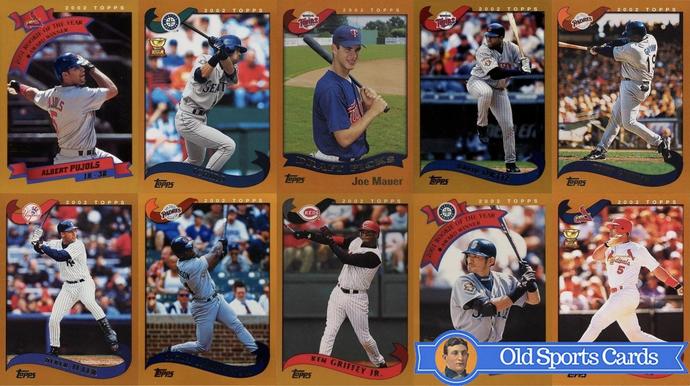
More...
With the release of the 2002 Topps baseball card set, the company looked to continue the strong momentum built around their outstanding set in 2001 that contained the highly-coveted Ichiro rookie card.
Had Albert Pujols's rookie been included in the 2001 Topps base set as well, their 2002 follow-up would've had even more to live up to...
But, even though the 2002 Topps set didn't end up seeing quite as much love in the end, it still held its own as a fantastic overall set.
The Joe Mauer rookie and second-year cards of Pujols and Ichiro anchor a 718-card checklist with an outstanding design and color scheme.
Along with those guys, there are several other big-name players whose cards have held up well if graded in top condition.
And in this guide, we'll take a look at the 15 most valuable.
Let's jump right in!

Ross Uitts - Owner
Love sports cards?
Get my weekly newsletter with the latest hobby updates delivered straight to your inbox!
Let's be clear: most of the cards from this set do not have any value these days.
Like the 2002 Donruss, Fleer and Upper Deck sets, print runs were large enough and print quality was good enough that there is generally enough supply to meet demand.
So, for the cards on this list to be worth much, they'll have to be graded by PSA to be in perfect, gem mint condition.
That means the card needs to be flawless.
Now that we got that out of the way, let's take a look at the list:
2002 Topps #622 Joe Mauer Rookie Card
Estimated PSA 10 Gem Mint Value: $300
Over two years away from playing in the Majors, Joe Mauer's impact on the Minnesota Twins organization was felt by fans and Twins employees alike all the way from Davenport, Iowa.
Selected first overall by the Twins in the 2001 MLB Amateur Draft ahead of such names as Mark Prior, Mark Teixeira, and David Wright, Mauer was the most pivotal prospect in Major League Baseball.
A team rarely finds a franchise catcher.
It's even rarer to find a franchise catcher with true game-changing talent in the batter's box.
So, while the Twins made headlines with their first playoff berth in 11 years, the Twins faithful were left to wonder just how much better Minnesota could be with Mauer in uniform.
Mauer hit .302 with four home runs, 23 doubles, and 62 RBIs in 476 plate appearances (411 at-bats) for the Single-A Quad City River Bandits in '02.
However, his production was secondary to his essential learning experience while adjusting to professional baseball competition.
By the end of the '04 season, Mauer was a Twin to stay and would go on to define a generation of Minnesota baseball.
His rookie card stands atop as the most important and desirable in this set.
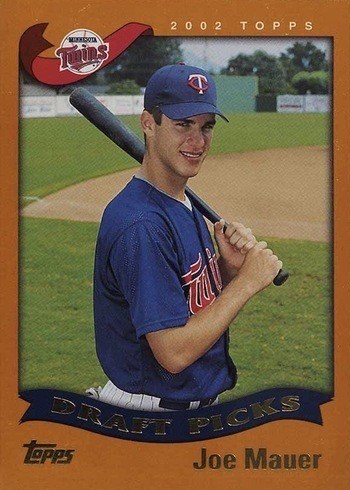
2002 Topps #160 Albert Pujols
Estimated PSA 10 Gem Mint Value: $250
After spending significant time at four positions during his rookie season, Albert Pujols settled into a regular left-field gig with the St. Louis Cardinals in 2002.
He also moved into the third spot in the batting order in May, where he'd remain until he left the Cardinals after the 2001 season.
A little stability went a long way for the 2002 NL MVP race runner-up.
The 22-year-old phenom was a revelation for a balanced St. Louis squad, becoming the first MLB player to hit .300 or better with at least 100 runs scored, 100 RBIs, and 30 home runs in consecutive seasons to start a career.
He finished in the National League's top ten in multiple offensive categories, including home runs (34, 10th), hits (185, 4th), batting average (.314, 7th), doubles (40, 8th), RBIs (127, 2nd), and runs scored (118, 2nd).
Other than a brief hiccup in May, there were never any signs of a sophomore slump for the reigning 2001 NL Rookie of the Year as he continued to rake all season long.
If you look closely at the reverse of some of these cards, you'll notice that sometimes Placido Polanco is pictured instead of Pujols.
Topps eventually corrected this mistake, but this error does not significantly increase the value of this card.
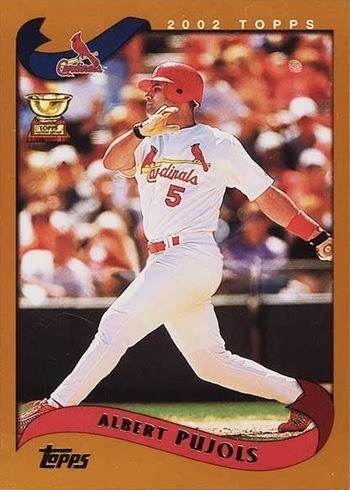

2002 Topps #225 Ichiro
Estimated PSA 10 Gem Mint Value: $250
Expectations were sky-high for Ichiro in 2002, following an electric debut campaign that saw him become the second player in MLB history to earn league MVP and Rookie-of-the-Year honors for the same season (Fred Lynn, 1975).
Not only that, but the Seattle Mariners were coming off a historic 116-win season, a record-tying team performance that ended with a thud in a five-game loss to the New York Yankees in the ALCS.
With this all in mind, it's easy to consider the 2002 season a letdown for Ichiro and the Mariners.
Suzuki was white-hot early in 2002 yet faded down the stretch.
A slump in the season's second half dropped his batting average from the high .300s to .321 for the season, good for fourth in the AL after he'd captured the league's batting title the year before (.350).
On the plus side, Suzuki finished second in the league with 208 hits, becoming just the fifth player in MLB history to open a career with consecutive 200-hit seasons and the first Mariner to post back-to-back 200-hit campaigns.
Yet, despite an impressive 93-69 record, Seattle ended up third in the division, ten games behind the West champion Oakland A's and six games behind the Anaheim Angels in the Wild Card race.
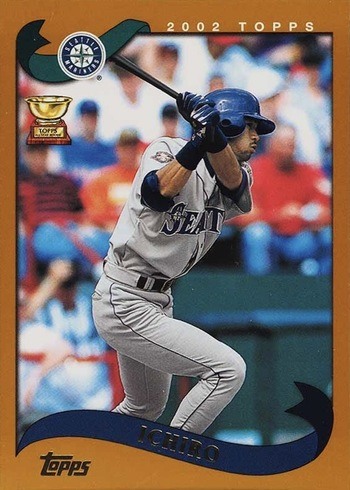
2002 Topps #165 Rickey Henderson
Estimated PSA 10 Gem Mint Value: $200
The odyssey that was the end of Rickey Henderson’s 25-year Hall of Fame career took yet another left turn before the 2002 season.
From 1997 to 2001, Henderson played with five different teams in six different stints.
Even in his forties, his veteran presence and ability to put pressure on opposing pitchers with his legs made him a commodity.
That’s why the Boston Red Sox took a flyer on Henderson in 2002, signing the 43-year-old outfielder to a minor-league deal.
Henderson eventually worked his way into a part-time role at the MLB level, hitting .223 with five home runs, 16 RBIs, and eight stolen bases in 222 plate appearances (179 at-bats).
The truth was that Henderson’s prime days were long since behind him. He wasn’t nearly as fast on the basepaths or quick with his bat.
Considering he was the oldest active player in the American League, it made sense.
His arrangement with the Red Sox came to a close at the end of the 2002 season.
Amazingly enough, he still had one more MLB stop left to go before he called it a career.
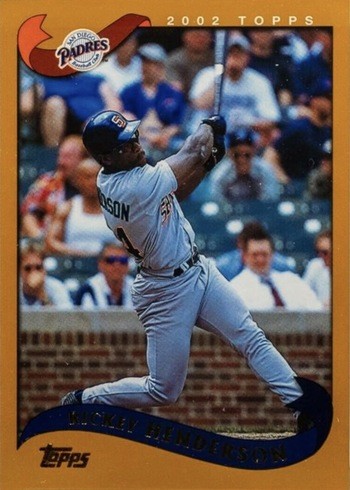
2002 Topps #99 Tony Gwynn
Estimated PSA 10 Gem Mint Value: $150
One of the greatest hitters to play the game, Tony Gwynn's absence loomed large during the 2002 MLB season.
Gwynn retired after his age-41 season in 2001, a part-time gig in which he hit .324.
That ended things for the San Diego Padres legend with a mind-boggling active streak of 19 seasons with an average of .300 or better.
With Gwynn out of the picture, the Padres embraced a full-scale rebuild.
The player that defined the franchise was now coaching the San Diego State Aztecs of the NCAA's Mountain West Conference.
It was time to change things up.
The Padres won just 66 games in 2002 and 64 in 2003, languishing at the bottom of the NL West standings while building their prospect base.
By 2004, the Padres unveiled a new logo and ballpark and embraced a brand-new direction with a mix of young and proven talent.
None of this would have been possible without Gwynn's contributions to the franchise.
He made the Padres relevant even during the lean years and helped garner the public support necessary to greenlight the Petco Park project.
An active player no longer, Tony Gwynn helped define the 2002 season and the Padres' future by simply being Tony Gwynn.
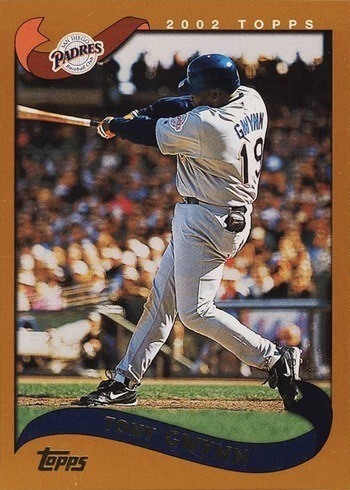
2002 Topps #410 Chipper Jones
Estimated PSA 10 Gem Mint Value: $125
As the Atlanta Braves' everyday third baseman from 1995-2001, Chipper Jones earned five All-Star nods and an NL MVP award in 1999.
So, you can see why he was slow to warm to the idea of moving to left field before the 2002 campaign.
During their free-agent pursuit of All-Star third baseman Vinny Castilla during the offseason, the Braves front office approached Jones about a potential positional shift.
Jones was hesitant but decided to make the switch for the team's benefit and his hitting approach.
"I used to spend so much mental preparation on defense, either working on it or worrying about it," Jones said. "I'm sure it took away from my offense."
Jones took to left field nicely in 2002 and continued to rake, slashing .327/.435/.536 with 26 home runs, 35 doubles, 90 runs scored, and 100 RBIs.
While he failed to crack the NL All-Star squad due to a stacked outfield ballot, he still finished 11th in the league's MVP race and helped Atlanta to their eighth consecutive NL East title.
Jones went 5-for-17 (.294) with five walks, three runs scored, and two RBIs in Atlanta's five-game NLDS tilt against the Giants.
However, a Russ Ortiz gem in Game 5 sealed a seventh-straight playoff exit for Atlanta without a World Series banner.
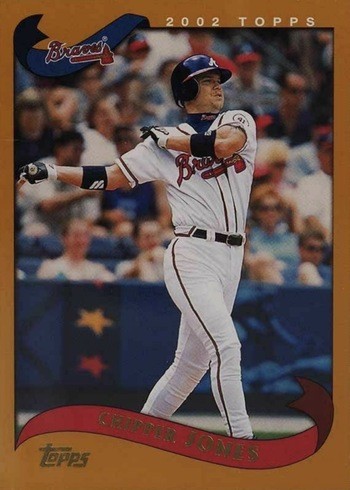
2002 Topps #550 Ken Griffey Jr.
Estimated PSA 10 Gem Mint Value: $125
After an injury-plagued 2001 season, Ken Griffey Jr. was determined to lead the Cincinnati Reds back to the playoffs for the first time since 1995.
And then, disaster struck again.
On April 7th versus the Montreal Expos, Griffey ripped his right patella tendon in the middle of a rundown between third base and home plate.
In hopes of returning at some point during the season’s second half, Junior opted for rehab instead of season-ending surgery.
He missed four months.
When he returned, however, Junior wasn’t himself.
He played in 70 games in total, hitting .264 with a ho-hum .784 OPS, eight home runs, and 23 RBIs in just 197 at-bats.
Cincinnati started strong and fell off late as Griffey struggled, losing 29 of their last 46 games to finish at 78-84.
The following offseason was a tricky one.
After three disappointing years, Griffey was the subject of intense trade rumors.
A hometown hero, Junior now found himself facing an uncertain future in Cincy.
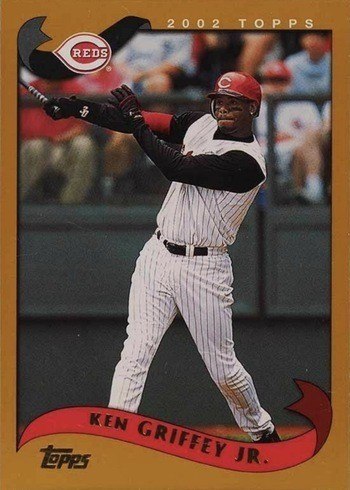
2002 Topps #75 Derek Jeter
Estimated PSA 10 Gem Mint Value: $100
From 1998-2001, Derek Jeter cemented himself as the face of the New York Yankees franchise, finishing no worse than tenth in the AL MVP race while leading New York to three World Series titles.
2002 was a different story.
Despite a career-best 32 stolen bases, '02 was a down year for Jeter as he hit under .300 (.297) and posted an OPS under .800 (.794) for the first time since 1997.
A down year by Jeter's lofty standards, though, isn't much of a down year at all.
He still finished third in the American League in runs scored (124), seventh in hits (191), and second in total plate appearances (730).
And the Yankees continued their dominant run atop the AL East in '02, finishing at 103-58 and securing their fifth-straight division title.
However, their stranglehold on the Americal League pennant loosened just four games after their regular-season finale.
The eventual AL champion Anaheim Angels showed zero fear against the Yankees juggernaut, dropping New York by winning three of four slugfests in a wild ALDS matchup.
Jeter went down with a heck of a fight, hitting .500 (8-for-16) with two home runs, six runs scored, 3 RBIs, and a 1.401 OPS.
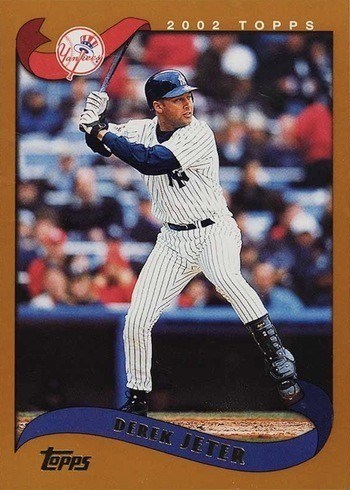
2002 Topps #425 Frank Thomas
Estimated PSA 10 Gem Mint Value: $75
Compared to his days in the early to mid-1990s, when he routinely put up astronomical numbers with the bat, Frank Thomas wasn't quite as dominant in 2002.
The season before had proven to be a rough one for Thomas.
In the very same week in 2001, after his father passed away, Thomas announced that he would undergo season-ending surgery after just 20 games because of a triceps tear.
At 34 years old, Thomas came into the 2002 season looking to bounce back from the personal and physical pain of the year before.
Thomas stayed healthy throughout the season, playing in 148 games though his batting average fell to .252 and his slugging percentage hovered around .472.
A career .301 hitter, Thomas never did manage to hit above .300 since his dominant season in 2000 when he finished second in the MVP vote.
However, he still had a nose for the home run and RBI, finishing with 28 home runs and 92 RBIs, proving he was still very much an offensive asset for the White Sox.
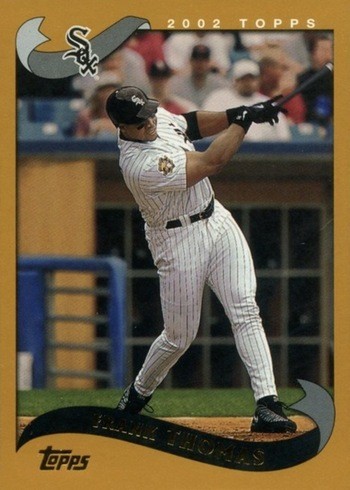
2002 Topps #435 Jose Canseco
Estimated PSA 10 Gem Mint Value: $75
You may be surprised to see Jose Canseco so high on this list.
But, remember, Canseco was one of the biggest names in the hobby during the late 80s and early 90s.
And kids who grew up collecting him are now adults full of nostalgia for that era.
Still, this card is one of the strangest Canseco cards, in my opinion.
He looks out of place in a Montreal Expos uniform, given that he never played in the National League, even ignoring that he didn't bother tucking in his shirt.
Before the 2002 regular season, Canseco signed a minor league contract with the Montreal Expos to be their left fielder, even though he had rarely played in the outfield during the previous three seasons.
In fourteen preseason games with the Expos, Canseco batted .200 and smacked three home runs while driving in five runs.
However, the team released him before Opening Day, and he wouldn't sign with another club for the rest of the season.
On May 13, 2002, Canseco announced his retirement from Major League Baseball, needing only 38 more home runs to reach the 500 club.
To this day, he remains one of the most controversial figures in MLB history, but again, there are still big-time Canseco collectors throughout this hobby.
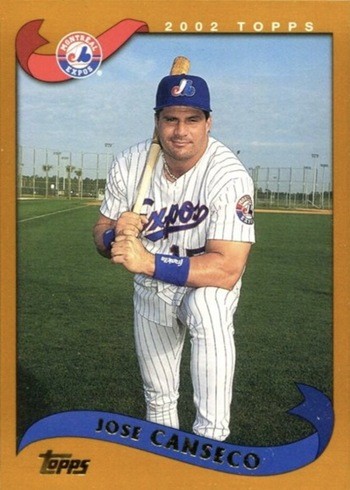
2002 Topps #489 David Ortiz
Estimated PSA 10 Gem Mint Value: $75
David Ortiz's final year with the Minnesota Twins began with bad injury luck.
After missing two-and-a-half months with a wrist fracture in 2001, Ortiz's left knee started to bother him early in the '02 campaign.
Further examination revealed bone chips in the joint, leading to surgery and a 22-game absence for the 26-year-old slugger.
When Ortiz returned, Minnesota penciled him in as their full-time DH though he still spent fifteen games at first base.
Focusing nearly exclusively on hitting, Ortiz flourished, hitting .272 with new career highs in OPS (.900), total bases (206), home runs (20), and RBIs (75).
The Twins made good on the promise of their 85-win season in 2001, capturing the AL Central at 94-67 and earning the franchise's first playoff berth since winning the World Series in 1991.
In the postseason, Ortiz gave the baseball world a glimpse of the clutch gene that would define his Hall-of-Fame stint with the Boston Red Sox.
Ortiz laced a ninth-inning RBI double off Oakland A's closer Billy Koch in the deciding Game 5 of the ALDS, extending Minnesota's lead to 5-1.
It proved to be the game-winning RBI after Oakland plated three in the ninth.
Unfortunately, the Twins were ultimately bounced five games later by the Anaheim Angels in the ALCS.
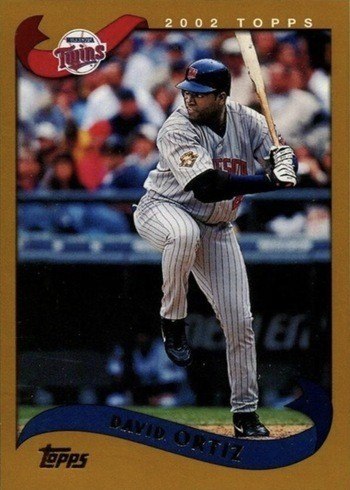
2002 Topps #704 Ichiro Gold Glove
Estimated PSA 10 Gem Mint Value: $75
As good as Ichiro was with the bat during his incredible rookie campaign in 2001, he was just as good with the glove in right field for the Seattle Mariners.
To commemorate his first Gold Glove, Topps released this card of the young Mariners superstar jogging in the outfield.
The words "1 Time Gold Love Award Winner" stamped along the bottom just above his name seem kind of amusing looking back.
Ichiro would start his career with ten consecutive Gold Glove Awards, the last of them coming during the 2010 season when he was 36 years old.
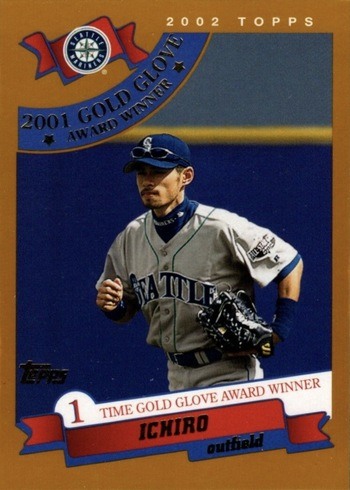
2002 Topps #716 Ichiro MVP
Estimated PSA 10 Gem Mint Value: $75
Ichiro led the Majors in plate appearances (738), at-bats (692), hits (242), and stolen bases (56) while also pacing the American League with a .350 batting average during his rookie 2001 campaign.
And, again, on defense he was incredible, too.
On the year, Ichiro picked up a Gold Glove, Silver Slugger, Rookie of the Year, and MVP honors.
It was quite an entrance to the big leagues and arguably one of the most outstanding debut campaigns of all time.
He didn't run away with the MVP, though.
His 289 vote points were enough to seal the deal, but Jason Giambi of the division rival Oakland A's was right behind him with 281 vote points, while his teammate Bret Boone landed 259 vote points of his own.
It would be Ichiro's first and only MVP of his Hall of Fame career and given how phenomenal he was, he'd finish in the top ten just three other times.
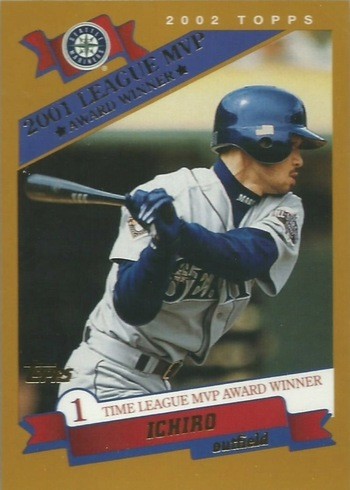
2002 Topps #718 Ichiro Rookie of the Year
Estimated PSA 10 Gem Mint Value: $75
The voting for AL Rookie of the Year wasn't nearly as close as the MVP vote and Ichiro easily took top honors in his rookie class with 138 vote points.
Cleveland's CC Sabathia, who had an outstanding career finished in second with 73 points and New York Yankees eventual superstar Alfonso Soriano took third with 35 points.
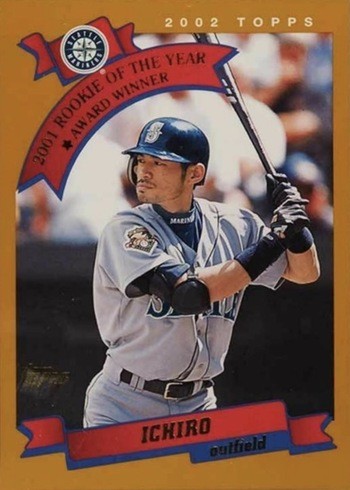
2002 Topps #719 Albert Pujols Rookie of the Year
Estimated PSA 10 Gem Mint Value: $75
The NL Rookie of the Year race was also a blowout, with Albert Pujols receiving 160 vote points while Houston's stud pitcher Roy Oswalt finished in second with 82 vote points.
A couple of other big names in Jimmy Rollins and Adam Dunn also received votes, but nobody was going to challenge Pujols for the honor, given his incredible season.
While batting .329, Pujols also belted 37 home runs, drove in 130 runs, and scored 112 runs.
And his .402 OBP, .610 slugging percentage and 1.013 were equally as impressive.
Surprisingly, none of the eye-popping numbers that Pujols put up as a rookie turned out to be league-leading, but he would pace the league in several areas in years to come.
Like Ichiro, Pujols put up one of MLB's most incredible rookie campaigns.
Thankfully, they didn't play in the same league as deciding on who to vote for Rookie of the Year would've been one of the toughest calls ever.
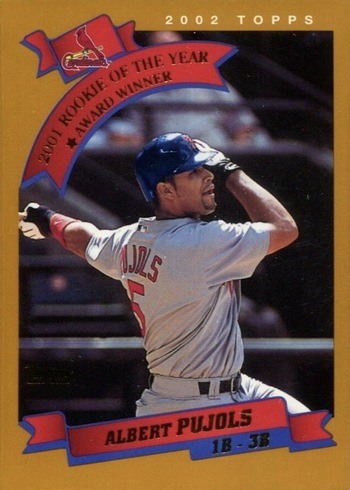
2002 Topps Baseball Cards In Review
The 2002 Topps set checklist clocked in at 718 cards divided among two series, 364 cards in Series 1 and 354 cards in Series 2.
Notable rookies included Joe Mauer, Rich Harden and Jason Bay.
Second-year base cards of Albert Pujols and Ichiro were also big attractions for hobbyists and Topps sprinkled those guys into several subsets as well.
As usual, there were of course many other big-name Hall of Famers such as Rickey Henderson, Tony Gwynn, Derek Jeter, Ken Griffey Jr. and others that can go for decent money in top condition these days.
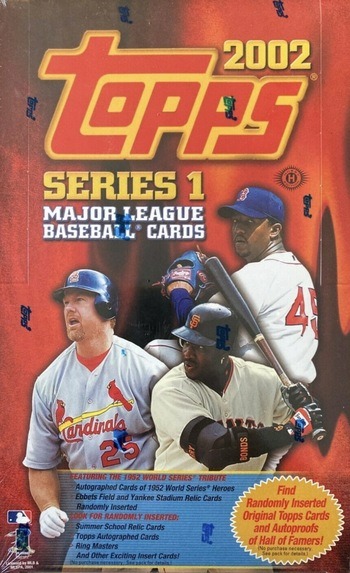
There are several subsets within the checklist, including:
- Managers (#277 - 305)
- Leading Prospects(#307 - 325; #671 - 690)
- Draft Picks (#326 - 332; #691 - 695)
- League Leaders (#337 - 348)
- Playoff Teams (#349 - 356)
- Season Highlights (#332 - 336)
- Gold Glove (#696 - 713)
- MVP (#716 - 717)
- Rookie of the Year (#718 - 719)
This is a decent set that contains multiple cards with a respectable value in high grade.
I've always liked this set's overall look and feel as the color of the borders makes the cards pop.
After the success of their set in 2001, Topps wasn't necessarily expected to meet or surpass it but their 2002 set was a nice one in its own right.

